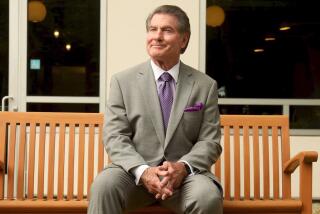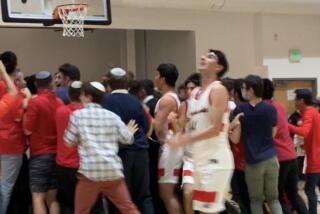‘Israeli Ice Man’ Is the Name and a Starring Effort Is the Game
INDIANAPOLIS — His nickname is the “Israeli Ice Man.” The son of a diamond merchant and a lawyer, Doron Sheffer didn’t sprout from America’s inner-city asphalt or heartland cornfields, like so many athletes whose backgrounds become public property this time of year. He is 24 and from a suburb of Tel Aviv.
Friends and family were cheering in Israel when their favorite foreign exchange student collected 27 points and seven rebounds Saturday, playing point guard in Connecticut’s 95-81 triumph over Eastern Michigan. “I think it was telecast live there, so they must know exactly what happened,” Sheffer said of the NCAA tournament game, which wouldn’t have begun in his homeland until 10 minutes before one in the morning.
Some believe Connecticut’s other guard, Ray Allen, to be the best college basketball player in America.
“He definitely has my vote,” Sheffer says.
Such is not, however, the case in Ramat Efal, Israel, where votes would probably be cast for Sheffer if he ran for office. His popularity there is not unlike Detlef Schrempf’s in his country, or Vlade Divac’s and Toni Kukoc’s in theirs. Many are aware that Sheffer has started 100 of 101 games since enrolling at Connecticut, which during this span has a record of 89-12.
A three-year hitch in the Israeli army didn’t hurt Sheffer’s game a bit, particularly since he spent much of that time dribbling a basketball.
“Ever shoot a gun?” some fool asked.
“Yes,” Sheffer said.
“What was your shooting percentage?”
Going along with the gag, Sheffer said, “Oh, 40%?”
After the game Saturday, a trainer stretched and twisted Sheffer like a rubber band, while having the 6-foot-5 senior lie on the locker-room rug. Wired and tired from 36 minutes of hounding Eastern Michigan’s foot-shorter Earl Boykins all over the RCA Dome court, Sheffer needed to get the kinks out before he could finally sit and relax.
“Ever seen Muggsy Bogues?” asked the same fool, who evidently thought Sheffer arrived in America day before yesterday.
“Sure,” Sheffer said. “I don’t think Boykins is as fast or strong as Muggsy, but he’s definitely a player.”
His job further complicated by the absence of Connecticut backup guard Ricky Moore, who was injured in last Thursday’s regional opener, Sheffer was a factor on both ends of the floor. Overlooking the 27 points, his coach, Jim Calhoun, described Sheffer’s defense as “magnificent.”
Allen is the superstar of this team, an NBA lottery pick should he turn pro, but Sheffer has a future in this game himself. He was offered $500,000 last summer to play professionally in Europe. Sheffer’s goal is to play in the NBA, but before going anywhere, the Israeli Ice Man is hopeful that Connecticut can finally reach the Final Four, after several years of near-misses.
In a loss to UCLA that eliminated the Huskies last year, Allen’s 36 points drew national attention, but Sheffer quietly added a career-high (at the time) 24.
“I really feel this year’s team can go all the way,” he says. “And that’s something I would hate to miss.”
Connecticut moves on to Southeast Regional play in Lexington, Ky., which to Sheffer had a familiar ring. Kentucky was the first school he visited when trying to choose one. Miami, Temple and Seton Hall also interested him, but Sheffer chose Connecticut, where he promptly became Big East freshman of the year. No NCAA Division I school has a better record than Connecticut’s over the last three seasons.
Back home, Sheffer was known for having led Galil Elyon to the Israeli national championship, including a 40-point night in the semifinals that people still talk about. He was discharged from the Army in the summer of 1993.
“I went through basic training, but had special treatment,” Sheffer says. “It’s very common. If you are very good in something, the Army gives you a chance to continue working at that to develop your career, whether it’s basketball or something else. I do feel that I missed a lot by not serving more as a soldier, but you can’t do both things.”
Someone asks if this experience has made him different in any way from the typical American college athlete.
“Definitely,” he says. “I’m older.”
More to Read
Go beyond the scoreboard
Get the latest on L.A.'s teams in the daily Sports Report newsletter.
You may occasionally receive promotional content from the Los Angeles Times.










